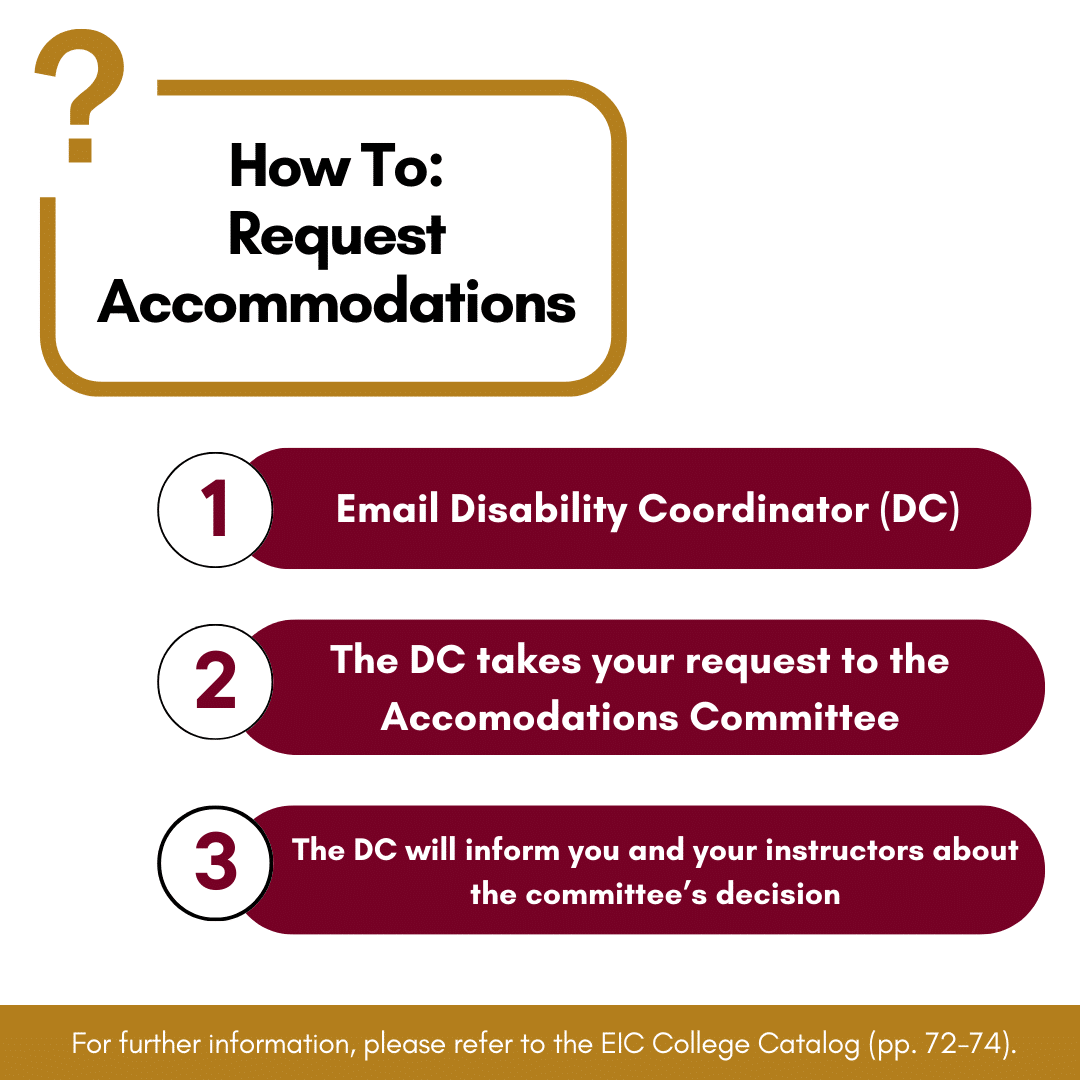Disability Services
Americans with Disabilities Act
The Americans with Disabilities Act (ADA), and Section 504 of the Rehabilitation Act, require Eastern International College to provide appropriate academic and employment accommodations to employees and students with disabilities unless doing so would create an undue hardship, compromise the health and safety of members of the College community, or fundamentally alter the nature of the College’s employment or academic mission.
Eastern International is committed to providing reasonable accommodations for qualified individuals with disabilities, including chronic illness in a fair and equitable manner, and in accordance with applicable federal and state law. All personnel who are responsible for the implementation of the College’s mission are charged to support this policy.
The Office for Civil Rights (OCR) enforces Section 504 of the Rehabilitation Act of 1973 (Section 504) and Title II of the Americans with Disabilities Act of 1990 (Title II) which prohibit discrimination on the basis of disability. The ADA ensures equal access and opportunity and protects individuals with disabilities from discrimination.
Eastern International College is committed to providing equal access to educational opportunities and prohibits any form of discrimination on the basis of race, color, religion, national origin, age, disability, sex, gender, sexual orientation, marital status, genetic information, and military/veteran status in the recruitment and admission of students and in the operation of all of its programs, activities, and services.
The information on this page regarding the Americans with Disabilities Act is based directly on the content from the US Department of Education. This link is also listed at the bottom of this page under the heading “References”.

The Disability Coordinator
The designated Disability Coordinator (DC) is the Campus Director. The responsibilities of the DC include the following: makes sure the policies and procedures for academic adjustments or any disability-related requests for accommodations are appropriately followed, answers questions of students regarding academic adjustments and other disability-related accommodations, receives letters of request for academic adjustments and reviews completeness of required documentations, coordinates with the Disability Committee, communicates with students who request for academic adjustments and provide specific faculty members completed Academic Adjustment Forms for students whose requests for academic adjustments have been approved.
The Disability Coordinator does not directly provide educational services, tutoring or counseling, or help students plan or manage their time or schedules. Students with disabilities are, in general, expected to be responsible for their own academic programs and progress in the same ways that non-disabled students are (U.S. Department of Education, Office of Civil Rights, 2011)
Standardized Entrance Exams, Testing Accommodations and Conditions, and Admission Decisions
Eastern International College (EIC) utilizes standardized exams/placement exams as partial criteria for course selection and/or acceptance into specific degree programs offered in the college (refer to the catalog for specific admission requirements). These exams measure the achievement, knowledge, or aptitude of the student. A student who will need testing accommodation will be referred to the Dean of the College, who is also the Disability Coordinator. Testing accommodation and/or change in testing condition should not fundamentally alter the examination or create undue financial or administrative burdens (U.S. Department of Education, Office of Civil Rights, 2011) to the College. Requests for testing accommodations and/or change in testing conditions should be done in writing and submitted to the Disability Coordinator within a reasonable amount of time, or four (4) weeks before the actual administration of the exam.
The EIC Policy and Procedure for Academic Adjustment applies to any testing accommodation and/or change in testing condition request. The decision on a request is decided by a committee tasked by the College to review and approved disability requests.
Admission decisions are made solely on admission criteria set by the College for each specific degree program. No student will be denied admission due to his/her disability. EIC has set essential technical and/or academic standards for admission to, or participation in, the College and its programs. Some EIC degree programs may require inquiry about a student’s ability to meet essential program requirements but such inquiry is not designed to reveal disability status.
Identification and Disclosure of Students with Disabilities
EIC does not have a duty to identify students with disabilities. Students are responsible for notifying designated institutional staff (College Dean/Disability Coordinator) of their disability should they need academic adjustment.
The disclosure of one’s disability is voluntary. A student has no obligation to inform the College that he/she has a disability; however, if a student wants EIC to provide an academic adjustment, or wants other disability-related services, the student must identify himself/herself as having a disability.
Request for Academic Adjustment
A student who requests disability accommodations under the Academic Adjustment policy must submit a written request via email to the College’s Disabilities coordinator elizabeth.reilly@eicollege.edu . All other Academic Adjustment requests must be submitted in writing to the Dean of Academic Affairs.
Academic Adjustments, Auxiliary Aids and Services
The U.S. Department of Education, Office of Civil Rights (2011) defines academic adjustments, auxiliary aids and services as:
Academic adjustments are defined in the Section 504 regulations as:
Such modifications to the academic requirements are necessary to ensure that such requirements do not discriminate or have the effect of discriminating on the basis of disability against a qualified applicant or student with a disability. Academic requirements that the recipient can demonstrate are essential to the instruction being pursued by such student or to any directly related licensing requirement will not be regarded as discriminatory within the meaning of this section. Modifications may include changes in the length of time permitted for the completion of degree requirements, substitution of specific courses required for the completion of degree requirements, and adaptation of the manner in which specific courses are conducted. Academic adjustments also may include a reduced course load, extended time on tests and the provision of auxiliary aids and services. Auxiliary aids and services are defined in the Section 504 regulations and Title II regulations. They include note-takers, readers, recording devices, sign language interpreters, screen-readers, voice recognition and other adaptive software or hardware for computers, and other devices designed to ensure the participation of students with impaired sensory, manual or speaking skills in an institution’s programs and activities. Institutions are not required to provide personal devices and services such as attendants, individually prescribed devices, such as eyeglasses, readers for personal use or study, or other services of a personal nature, such as tutoring. If institutions offer tutoring to the general student population, however, they must ensure that tutoring services also are available to students with disabilities. In some instances, a state VR agency may provide auxiliary aids and services to support an individual’s post-secondary education and training once that individual has been determined eligible to receive services under the VR program.
EIC has designated a committee to review and make decisions on all requests for academic adjustments and other disability-related accommodations. An academic adjustment or disability-related accommodation should not alter or waive essential academic requirements. It should not also fundamentally alter the nature of a service, program or activity or result in undue financial or administrative burdens considering the College’s resources as a whole (U.S. Department of Education, Office of Civil Rights, 2011).
- A student who wants to request for academic adjustment should notify in writing the Disability Coordinator (DC) as early as possible to ensure that the College has enough time to review his/her request and provide the appropriate academic adjustment.
- If the academic adjustments provided are not meeting the student’s needs, it is the responsibility of the student to notify in writing the Disability Coordinator as soon as possible.
- EIC does not provide specialized tutors or individual assistants for students.
The Individualized Education Program (IEP)/ 504 Plan
The IEP/ 504 plan, no matter how recent, is not a sufficient documentation to support the existence of a current disability and need for an academic adjustment although an IEP plan may help identify services that have been used by the student in the past (U.S. Department of Education, Office of Civil Rights, 2011) . It is therefore important for a student to understand that an IEP (or 504 Plan) does not suffice as adequate documentation for a request for academic adjustment. Students requesting for academic adjustment must provide the required documentations stipulated in EIC’s Policy and Procedure for Academic Adjustment.
Procedure and Policy for Academic Adjustment
A request for disability accommodations must be in writing and sent via email to the College’s Disabilities Coordinator (Campus Director).
This email must also include:
- Documentation prepared by an appropriate professional, such as a medical doctor, psychologist, or a qualified diagnostician containing the following:
– Diagnosis of current disability
– Supporting information that include date of diagnosis
– How the diagnosis was reached
– Credentials of the diagnosing professional
– Information on how the disability may affect academic performance and major life activities
– Specific recommendations for accommodations - The student is responsible for all evaluation and documentation of his/her disability.
- All accommodation requests, along with their supporting documentation, will be reviewed by the Accommodations Committee, comprised of the Disability coordinator, the dean or chair of the department, and a full time faculty member from the same department.
- EIC does not waive or lower essential program requirements to accommodate an academic adjustment.
- This policy and procedure is applied to all disability-related requests.
Grievances
Students who wish to grieve the decision of the Accommodations Committee must follow the Grievance/Complaint Protocol outlined on p. 43 of the College catalog available here .
Reference
U.S. Department of Education, Office of Civil Rights. (2011). Students with disabilities preparing for post-secondary education: Know your rights and responsibilities (rev. ed.). Retrieved from http://www2.ed.gov/about/offices/list/ocr/transition.html
